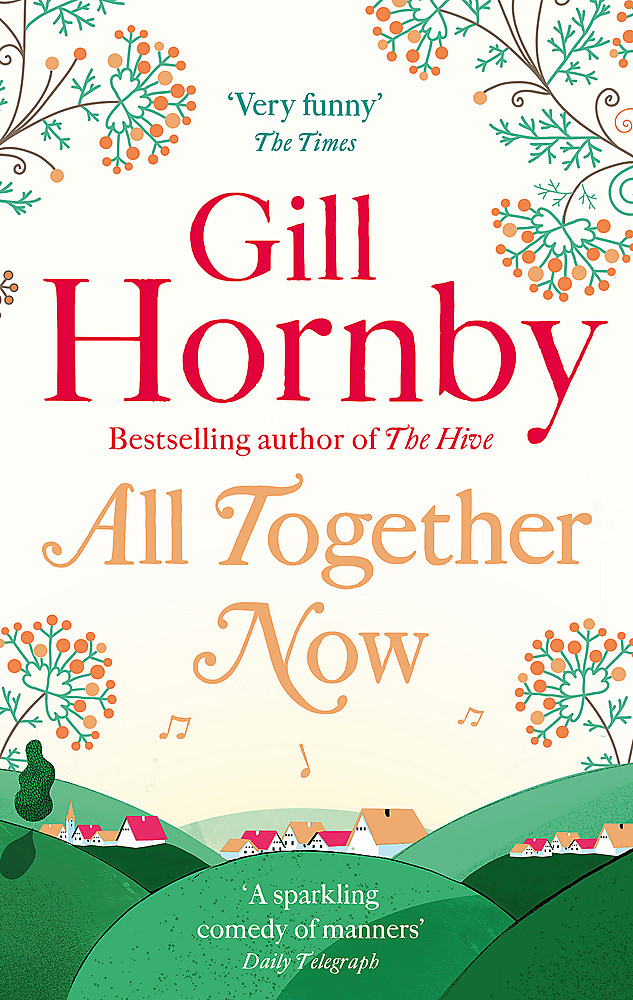
Sometimes all you really want is a nice, “feel-good” novel – something to chase away the darker clouds of a difficult day. The best of them will have characters you’ll warm to, a plot with a few surprises and an emotional pull – tears or laughter, either way, I’m not fussy.
I haven’t been in a choir since school, but still remember the whoosh you get when a lot of people get together and harmonise in song. Gill Hornby brings her joy for choral singing into her story about a struggling choir in a dead-end town. All Together Now follows the lives of three main characters: socially-awkward Bennett, once a choir boy and now, recently single again, he’s at a loose end; librarian Annie who does all the donkey work for the choir as a way of dealing with her “empty nest”; and Tracey, who is too cool for choirs, but can really belt out a number in the privacy of her home. Tracey also has a burning secret.
The story starts off with a car accident that leaves the Bridgeford Community Choir rudderless, its choirmaster hospitalised and in a coma. There’s a county choral championship up for grabs, and a town in dire need of invigorating – but can a medley from The Sound of Music or The Carpenters be the answer?
Tracey spots the choir performing outside the station one day and it makes her cringe. She’s one of life’s soloists. When her layabout son of twenty-two goes out to work one evening, she suddenly feels liberated. She dusts off her old music collection and begins to sing. A knock on the door and there’s someone she recognises; it’s Lewis from the choir, surprisingly also a neighbour, who rather than demanding Tracey turn it down a bit, implores her to join their choir.
Tracey became aware that, rather than the raspy, throaty one that she used when she was singling along with Billy, she was using her chest voice for once, and she could feel the calming, anti-depressant effect it had on her stressed-out body. But it wasn’t until she was back in the living room, tucked up with her glass and the bottle on the sofa, that she realised exactly what it was she was singing. Christ almighty. Those bloody belters had wormed into her ear, through to her brain, down to her lungs. They had regressed her. She was regressing. For the first time in nearly thirty years, she was spending the night in alone pretending to be Karen bloody Carpenter. How sad was that?
The story follows the lives of Annie, Tracey and Bennett in parallel to the struggling choir that might just save them all. Tracey finds she’s not such a soloist after all, in the choir or in life; Bennett steps up to help save the town, and proves to his kids that he’s almost kinda cool; Annie takes a hard look at her marriage and makes a surprising discovery. And the choir gets a bit better. It’s an uplifting tale, but it’s also full of laughs and dry wit, particularly in the way the characters bounce off each other, disagree but also sing together. There are some amusing and some discordant minor characters that give the plot a bit of tension.
The story is peppered with music – the lines of songs nicely mixed in the scenes describing the choir in rehearsal so you have a sense of how it all sounds. Most of the songs are pretty familiar, but in case you don’t know them there’s a handy play-list of at the back and even a Spotify link so you can hear them as well.
All Together Now really hits the spot for a big-hearted, cheering sort of read, more character driven than a gripping page-turner, the prose bright and witty. I’ll probably not be rushing off to join a choir anytime soon, but will happily curl up on the sofa with another book by Gill Hornby. This one’s a four-star read from me.


 I am so glad I read Miller’s latest as an ebook because such is the dramatic tension he maintains throughout, that if it had been a regular book, I would have been flipping to the end to see what happened.
I am so glad I read Miller’s latest as an ebook because such is the dramatic tension he maintains throughout, that if it had been a regular book, I would have been flipping to the end to see what happened.  The last time I read a novel by this author, it was set in the world of art dealing and gallery exhibitions (The Gallery of Vanished Husbands). No points for guessing that this book has music as its background, the song collector of the title being Harry Fox-Talbet, a composer. The story is told over two time periods, the first just after World War Two, as Harry, his brothers, Jack and George, return with their father to the family mansion that had been requisitioned by the army for the duration.
The last time I read a novel by this author, it was set in the world of art dealing and gallery exhibitions (The Gallery of Vanished Husbands). No points for guessing that this book has music as its background, the song collector of the title being Harry Fox-Talbet, a composer. The story is told over two time periods, the first just after World War Two, as Harry, his brothers, Jack and George, return with their father to the family mansion that had been requisitioned by the army for the duration.